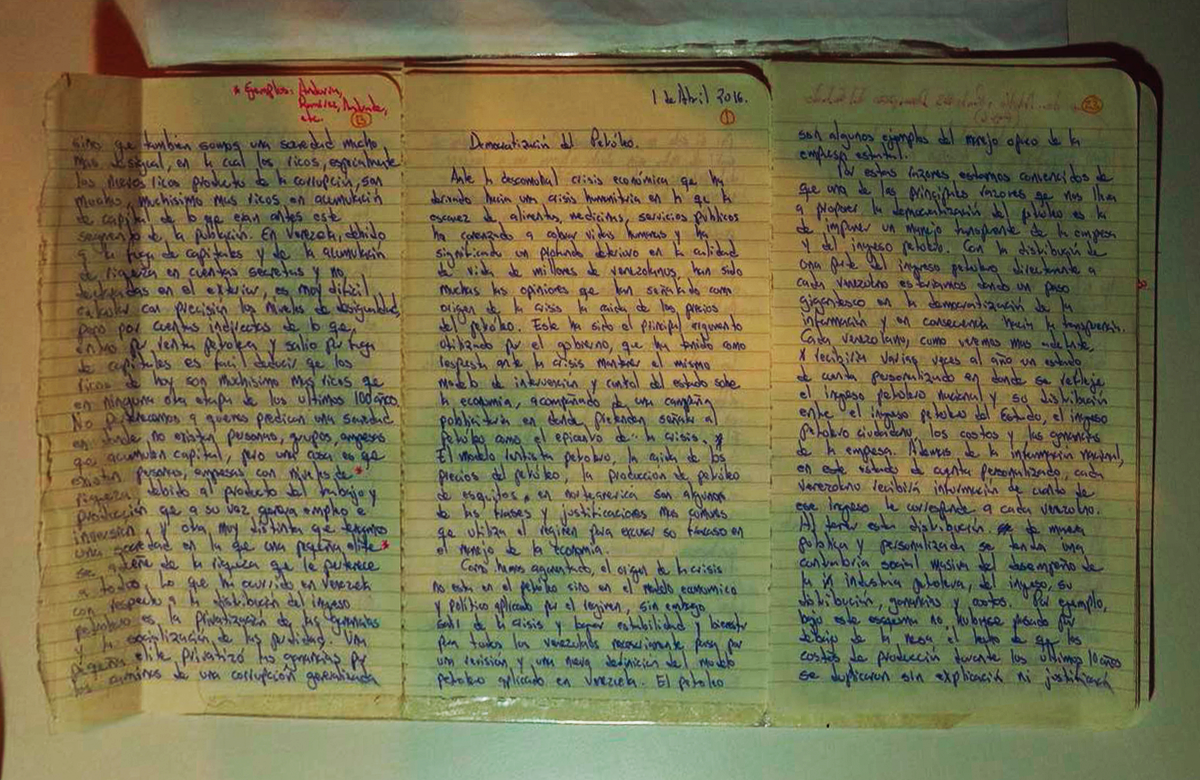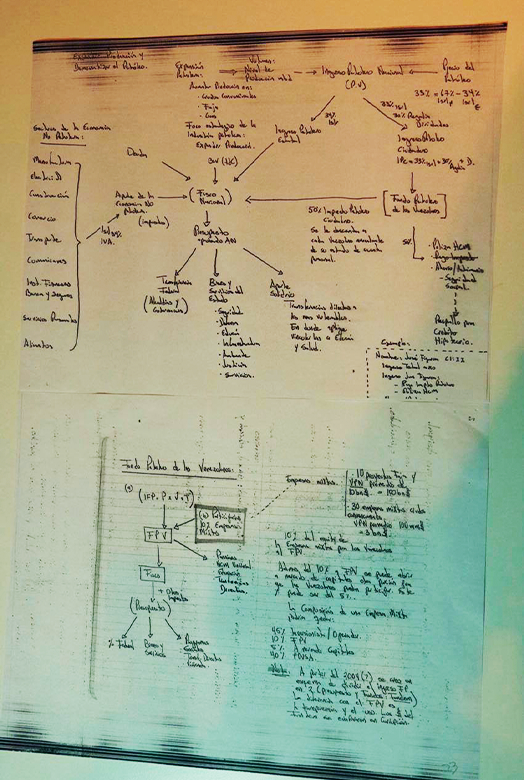Coming Up With a Plan: Venezuela Energética
If Venezuela has 20% of global oil reserves, why does it contribute only 2% of global output? The story of how these authors arrived at the answer is as captivating as the answer itself. Here's the Executive Summary of Venezuela Energética.


They can imprison a man but not his ideas.
Leopoldo López has been behind bars for over three years. Declared a thought prisoner by Amnesty International and by the very judge who sentenced him, he kept his thinking fresh and untainted by injustice from the solitude of his cell. His books were confiscated.
He wrote on walls that were painted over and used his over 80 court hearings to take what he wrote out of jail in secret.
He wrote on sheets of paper later seized by guards.
He wrote on his wife and mother, literally, so they could carry his ideas out of prison. The guards made them undress and erased the words with alcohol and cotton.
Yet somehow, Lilian and Antonieta managed to extract it all, sometimes learning it by memory, sometimes as tiny bits of paper in their hair or chewing gum.
It all got to Gustavo Baquero, a brilliant industrial engineer from UCAB, with a master’s degree from the IE Business School in Madrid and studies in the John F. Kennedy School of Government of Harvard University.
This is the product of that process – Venezuela Energética, Leopoldo López’ and Gustavo Baquero’s proposal, it’s the most audacious plan to come out in years, materialized as a book. It comes right when the current regime’s policies have buried not just the country but the entire hydrocarbons sector in the deepest crisis, pushing PDVSA to the brink of destruction. The magnitude of the collapse is such that Venezuela’s oil output has dropped by 250,000 barrels per day in just two months.
After reviewing the facts, ideas and characters of our oil history, Venezuela Energética analyzes the current reality and makes its proposal through a question: If Venezuela has 20% of global oil reserves, why does it contribute only 2% of global production?
King Hubbert’s model predicted that the U.S. oil output would reach its peak in the 70s, but demand would keep growing. That model, elevated to a global industry, was the platform for those advocating output cuts based on “resource shortages.”
Hubbert didn’t predict the impact of technology, like fracking, which would allow exploitation of light crude and gas reserves contained in oil slab stones, unleashing a structural change in oil markets. Hydrocarbons, which were deemed “scarce” by definition, suddenly became abundant. Now what matters is “peak demand” instead of “peak oil.”
Oil belongs to the sovereign, which is the people, not the State. A part of oil income must go directly to citizens.
For a country like Venezuela, this new reality demands an urgent change in oil policies. Our country can’t keep losing its market participation, and López and Baquero argue that our production should be increased to five million barrels per day (environmental concerns and new technologies now limit their useful life); 10,000 conventional oil wells that are currently shut down but can be recovered and opened to a bidding process for companies capable of boosting daily production, creating about 80,000 direct jobs and nearly 320,000 indirect jobs.
But boosting production isn’t enough. We’d also need to democratize oil; López and Baquero propose the creation of a Property Fund for Venezuelans, to turn oil into a citizen property. Oil belongs to the sovereign, which is the people, not the State. A part of oil income must go directly to citizens, only to be used for specific tasks (premiums for hospitalization, mortgages, pensions), creating and enhancing a direct relationship between our main national income and what public servants do with it in the eyes of the people.
Venezuela Energética goes into great detail about how energy reforms can transform Venezuela’s future, which is the discussion nobody dares to have now. You can’t talk about national rebirth without having a clear notion of how our biggest industry will be dealt with, and this is all described for you in the executive summary attached here, a fine overview to López’ and Baquero’s achievement.
Our economic situation demands urgent national debate. Therefore, it’s imperative to open a far-reaching dialogue on the development of tomorrow’s economy, and Venezuela Energética can be the catalyst for that.
Venezuela Energética – Executive Summary by Caracas Chronicles on Scribd
Caracas Chronicles is 100% reader-supported.
We’ve been able to hang on for 22 years in one of the craziest media landscapes in the world. We’ve seen different media outlets in Venezuela (and abroad) closing shop, something we’re looking to avoid at all costs. Your collaboration goes a long way in helping us weather the storm.
Donate








